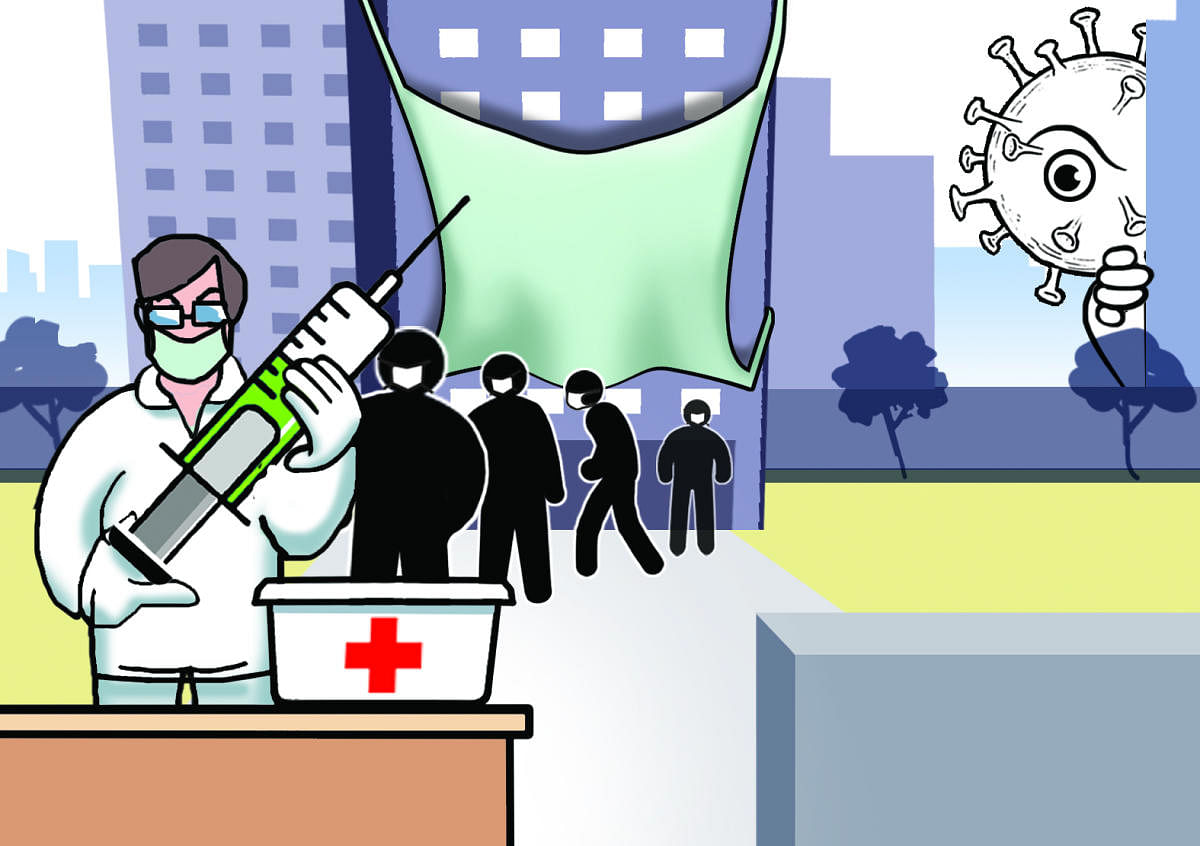
In the first few months of the Covid-19 spread through the city, apartment complexes had battled the pandemic with an edgy resilience marked by innovation, collective planning and spirited activism. Is the recent spurt in cases indicative of a lowering of guard?
Read | Scientists warn India's Covid-19 cases could rise again; 7 states worst hit as per recent data
The scare is real. For instance, the RT-PCR test results from apartment complexes in Bellandur and Mahadevapura have been showing a disturbing rise.
The Palike has declared six blocks of an apartment complex in Bellandur as a containment zone. Mahadevapura, as data from the BBMP War Room reveals, has topped the list of daily Covid cases since November 2020.
Lowering of guard
But this lowering of guard is not specific to apartments, reminds Bangalore Apartments Federation (BAF) General Secretary Vikram Rai. “It has been widely prevalent since January with a general sense of opening up under the Unlock phases.”
The clusters are still limited to a few localities. However, Vikram hastens to add, a majority of apartments attached to BAF have ensured that party halls, gyms, swimming pools remain closed. “The practice of restricting doorstep delivery of goods and services also continues as a precautionary measure.”
The isolated cases are, but a subtle warning that complacency cannot be allowed to set in. “At the end of the day, the virus is still there. Till vaccination, we are all still at risk. All kinds of information are coming in, from both substantiated and unsubstantiated sources, and we can’t afford to let our guards down.”
General laxity
But the general sense of laxity in the mandatory mask-wearing, sanitisation and social-distancing poses an increasing risk of hastening a second wave. At the forefront of the Covid battle when the pandemic was spreading fast last year, Dr Ambanna Gowda, Consultant-Internal Medicine, Fortis Hospital, says the restrictions have not been followed strictly and this could get tricky.
“Everything seems normal. A general sense of precaution should come from within, especially when the borders are all opening up,” he notes.
The surge, Dr Gowda asserts, will definitely come. “There are already signs. Since the last two weeks, hospitals are reporting more cases of sore throat, cough and lower respiratory tract infections. The numbers are not yet alarming, but compared to December-January, when there were zero cases, the situation is getting grimmer,” he informs.
Best practices
The rising cases could easily become a second wave, agrees Vikram. And that is precisely why apartments should go back to the do’s and don’ts that BAF had widely circulated last year. The best practices, institutionalised in several apartment complexes during the pandemic highs, should be reinforced with reasonable relaxations.
At the height of the pandemic, BAF had barred the entry of all domestic helps. “This is not a fair stand to apply now. But people should stick to enforcing strict mask-wearing and basic santisation. More than three people inside a lift is not advised. In common areas, masks and social-distancing are still very important,” elaborates Vikram.
Covid trackers have attributed the recent spurt in a few apartment complexes to two main factors: Unrestricted partying / get-togethers without the necessary precautions, and arrival of people from States now showing high active cases. Can these be controlled?
Outstation arrivals
To regulate arrivals from Maharashtra, the State Government here had mandated a negative RT-PCR certificate not older than 72 hours. This applies to passengers arriving by flights, buses, trains and personal transport. These guidelines were later applied to students arriving from Kerala and bound for hostels, colleges, paying guest accommodations, hotels and lodges.
Airline staff has to verify the reports at aircraft boarding gates while TTEs are required to check aboard trains. For those coming by personal transport, random checks are mandated at toll gates and other entry points. However, besides the airport verifications, the checks are not foolproof.
In its latest directive, the State Department of Health and Family Welfare has asked hostel residents not to allow visitors/relatives without obtaining express permission from the Covid nodal officers. A competent authority, the Department says, should be tasked with maintaining a list of students travelling to and from Kerala from the hostel/college. Many of these hostels are in apartments.
This precaution, as Dr Gowda notes, is critical. “Last time too, other States showed a big increase and later the trend started showing up here.” The message is clear: Do not lower the guard, the virus is still active and waiting to slip through every loophole.